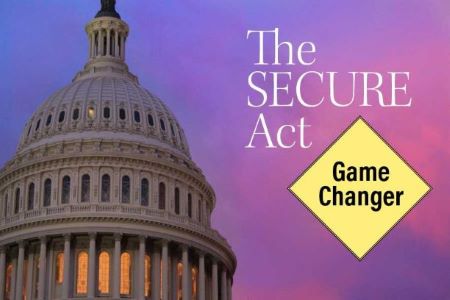
The #SECURE Act legislation expands savings opportunities for workers and includes new requirements and incentives for employers that provide retirement benefits.
Benefits for those with retirement savings accounts
Later #RMDs
If you were born on or after July 1, 1949, you can delay your RMDs (Required Minimum Distributions) until the age of 72 instead of 70 ½. This is helpful to those who don’t need to use their RMD’s for living expenses. They can keep their account intact longer; not pay income tax on the disbursements and continue to take advantage of the tax-deferred growth.
Change in #IRA age limit
As long as you have earned income, you can contribute to your traditional IRA past the age of 70 ½. This is useful for older workers who would like to continue to save and also reduce their taxable income.
Tax breaks
The threshold for medical expenses has been reduced from 10% to 7.5% of your adjusted gross income. Also, withdrawals may be taken from IRAs to pay medical expenses that are higher than 7.5% without incurring the 10% penalty. In the case of birth or adoption, you are allowed up to a $5,000 withdrawal to cover expenses. But you will still pay income tax on the withdrawals.
Help to promote savings
Employers must provide annual statement to employees participating in defined contribution plans. You can opt to automatically increase your monthly contributions until you reach 15% of your salary; up from 10%.
Part-time Employees
If you will be a part-time worker 21 or older and work over 500 hours annually, consecutively for 3 years, you will be allowed to contribute to a qualified retirement plan. Previously, it was 1,000 hours and one-year service. Employers will not be required to make matching contributions.
Small Business Benefits
One intention of the SECURE Act is to make qualified retirement plans more affordable for businesses with less than 50 employees. There will be more tax credits for small businesses starting a new retirement plan for employees. The new credits will be available for 3 years. There will also be changes to the Multiple Employer Plan (MEPs) requirements making it easier for small businesses to join other small businesses in a group to attain more favorable prices and benefits that are offered to larger businesses. And if an employer in the MEP defaults, the others in the group will not be disqualified.
No More #Stretch IRAs
A Stretch IRA pertained to an IRA inherited by a non-spouse beneficiary that could then be passed down through the generations while taking advantage of the tax benefits. Now if the beneficiary is more than 10 years younger than the original account owner, the inherited account must be liquidated within 10 years. There are exceptions to this regulation. This could mean bigger tax consequences to younger beneficiaries. Due to these revisions you may want to consider switching a traditional IRA to a Roth IRA.
Your #financial advisor can further explain the changes and better guide you to the type of #investment more suitable to your personal needs.
